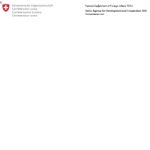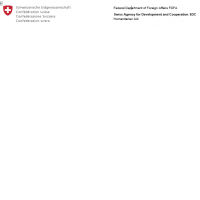
FDFA / SDC / Humanitarian Aid and SHA

Company presentation
Humanitarian Aid is one of the four departments of the Swiss Agency for Development and Cooperation SDC. It is involved in protecting the interests of vulnerable population groups prior to, during and after periods of conflict, crises or natural disasters.
The Swiss Humanitarian Aid Unit (SHA) is the operational arm of Swiss Humanitarian Aid. Its specialists are deployed to implement projects of the SDC or its UN partners before, during and after periods of crisis or conflict.
Please note that not all types of contracts and advertisements are listed in cinfoPoste. Find all of them here.
Job description
Verify your compatibility with this job ad
The compatibility is only an indication and should not discourage you from applying if you think your profile matches. It is also not taken into consideration for recruitment.

? %
Operational Environment
- The Democratic Republic of the Congo (DRC) has been facing a complex emergency since the mid1990s, with the eastern part of the country being the most affected. Non-state armed groups have been increasingly active in recent years, particularly in North Kivu, South Kivu, and Ituri provinces.
- Since the end of 2021, there has been a resurgence of M23 activity in North Kivu, leading to significant efforts by the Congolese Armed Forces (FARDC) and the United Nations Organization Stabilization Mission in the Democratic Republic of the Congo (MONUSCO) to combat this armed group. Additionally, Ugandan forces were deployed in North Kivu in November 2021 to address the threat posed by the Allied Democratic Forces (ADF), an affiliate of the Islamic State in the Beni area. In May 2022, the East African Community (EAC) decided to deploy a regional force in East DRC to combat both national and international non-state armed groups. FARDC units are frequently deployed from other parts of the country to tackle emerging threats in the eastern provinces.
- A system-wide scale-up was activated in June 2023, extending up to 31st December 2023, aiming at responding to growing needs in Ituri, Nord Kivu and Sud Kivu provinces. Conflict between M23 and FARDC affiliated forces flared up again in December 2023 and was still very intense as of mid-December 2023. National elections are to be organized on 20 December 2023. Security and access conditions in the three provinces are not likely to improve in 2024, while humanitarian needs are expected to remain as high as they were during the scale-up period.
- Insecurity affects the ability of aid organizations to deliver assistance, often leading to delays, suspensions, or relocations of operations. Humanitarian actors and goods are sometimes targeted by attacks or requested to pay fees at checkpoints, established by both security forces and armed groups. Access constraints were assessed as “severe” in 13 out of a total of 105 health zones, affecting around 802,000 people in need. An additional 44 health zones, with a population of 3.7 million in need, face “moderate” access constraints, while 58 health zones, encompassing 4.6 million people in need, have “low” access constraints, according to surveys conducted in 2022.
- Bureaucratic obstacles and poor road infrastructure also hamper the rapid delivery of humanitarian aid, particularly by national and international NGOs. The humanitarian leadership has raised concerns about the critical humanitarian situation in eastern DRC and the need for humanitarian actors to urgently strengthen their capacities to preserve the progress made in terms of access and expand their interventions to more hard-to-reach areas, ensuring that no one is left behind.
Main tasks and duties to be executed:
- Prepare or contribute to various written reports, documents and communications related to humanitarian access, e.g. access severity report, draft snapshots, briefing notes, case studies, presentations, correspondence, etc.
- Contribute to developing policy guidance on principled humanitarian access in the DRC context.
- Responsible for maintaining exhaustive access incidents database (AMRF) and Access Severity to the extent possible. Produce regular analysis on access based on existing data to convey messages and scenarios; develop outreach materials, including posters, presentations and other visual aids.
- Maintain links with various OCHA sub-offices and external partners to identify, analyze and track key access challenges.
- Collaborate with other humanitarian actors to plan and operationalize concrete responses to access-related challenges and constraints. Develop lessons learned, guidelines and innovative approaches related to safeguarding humanitarian principles and the effective delivery of humanitarian aid.
- Contributes to access coordination activities, in particular by supporting OCHA sub-office access forums; organize follow-up work to support access-related work and decision-making on important issues.
- Performs other duties as may be required by the OCHA Head of Access/CMCoord Unit in DRC, including access negotiation.
OCHA DRC plays an essential leadership role in humanitarian access.
- Given the impeding need to increase OCHA DRC access unit analysis capacity related to the accelerated MONUSCO withdrawal, departure of the East African Community Regional Forces, deployment of new SADC regional forces, and the need to maintain a strong humanitarian response capacity in the East achieved with the activation of the system wide scale up which will be deactivated at the end of December 2023, the team needs urgent support in the following two areas by a surge support P4 for 12 months: Access analysis (providing leadership on access and incidents analysis, producing monthly access reports + training the team to facilitate the process of collating and producing these reports).
- Support in setting up policy guidelines on access, support the access unit in any other task which could contribute to facilitating humanitarian operations in DRC, in particular access negotiations.
- OCHA’s role and key challenges: It is OCHA’s urgent task to provide critical coordination services to humanitarian partners to enable them to effectively deliver humanitarian assistance to people-in-need. This array of coordination services includes access/humanitarian negotiation/humanitarian-civil-military coordination (CMCoord) that ensures constructive dialogue and appropriate interaction with military forces and other relevant actors to facilitate humanitarian access, promote the protection of civilians and principled humanitarian action, and ensure the safety and security of humanitarian organizations and activities. OCHA’s efforts at the local level are complemented by provincial and capital level interaction.
- Expected outcome of the deployment): It is expected that the SBPs will strengthen OCHA’s current capacities to conduct access analysis, and support the management of daily access activities.
Specific required skills:
- Fluency in French and English
- Knowledge of institutional mandates, policies and guidelines pertaining to humanitarian assistance. Excellent writing, analytical and communications skills.
- Proficiency in data analysis, report creation, critical inference from data, and efficient use of MS Excel. The ideal candidate should possess strong attention to detail, problem-solving skills, and data management abilities.
- Experience in working with multiple organizations.
- Ability to work in a multi-cultural team under demanding working conditions.
- Ability to work in a stressful working environment and meet tight deadlines.
- Experience in humanitarian affairs/humanitarian coordination at sub-national/sub-office level is desirable.
- Experience or strong knowledge of Eastern DRC is desirable.
Please note: only applications from Swiss or Lichtenstein nationals, or holders of a C permit in Switzerland, will be considered.
- Duty Station: Goma (North Kivu), travel will be expected from Goma to other provincial capitals in Eastern DRC (Bunia, Bukavu, Kalemie) and occasionally to deep field locations. All travel costs will be covered by the CO. The incumbent may travel within DRC between 15% and 25% of his total deployment time.
- R&R cycle: 8 weeks
- Timeframe: asap for 12 months
- Deadline to apply: 29.02.24
For additional information please contact Alessandro Palmoso ([email protected]), 058 461 15 35).
Thank you to send your application at the earliest by Email to:
Isabelle Mellana ([email protected])
0258 462 35 29
Published: 15.1.24/MZI
Map
More details
Working hours (%): 80-100%
80-100%
Type of contract: Staff (Permanent and Fixed Term)
Duration: 12 months
Driving licence: Car driving licence
Macro-area: Sub-Saharan Africa
Level of experience: Senior Professional, more than 5 years
Area of work: Monitoring and Evaluation, Results-based Management
Area of work: Advocacy, Media and Communication
Area of work: Democracy, Governance, Human Rights, Law, Public Administration
Type of organisation: Governmental Actors
Remote work: No
Join date: asap
To help us track our recruitment effort, please indicate in your cover/motivation letter where (ngotenders.net) you saw this job posting.

